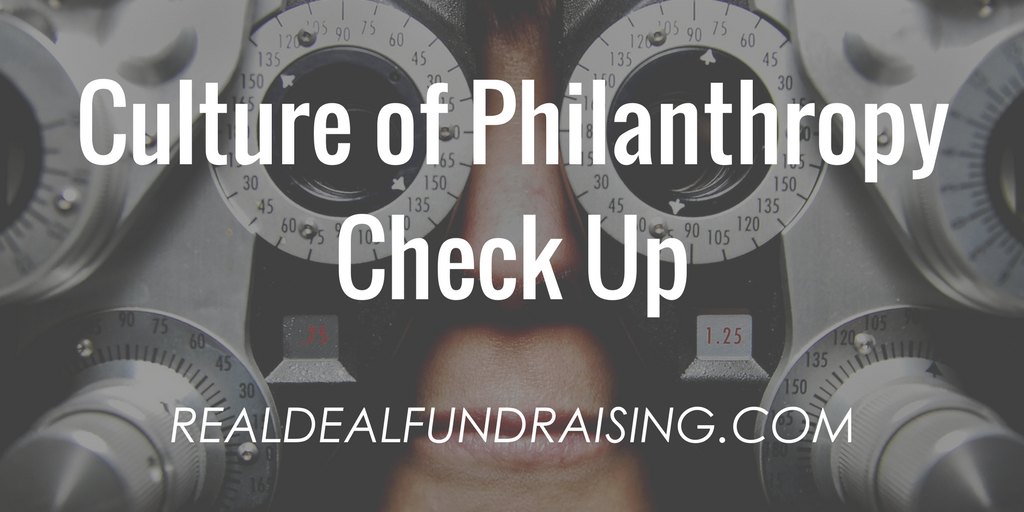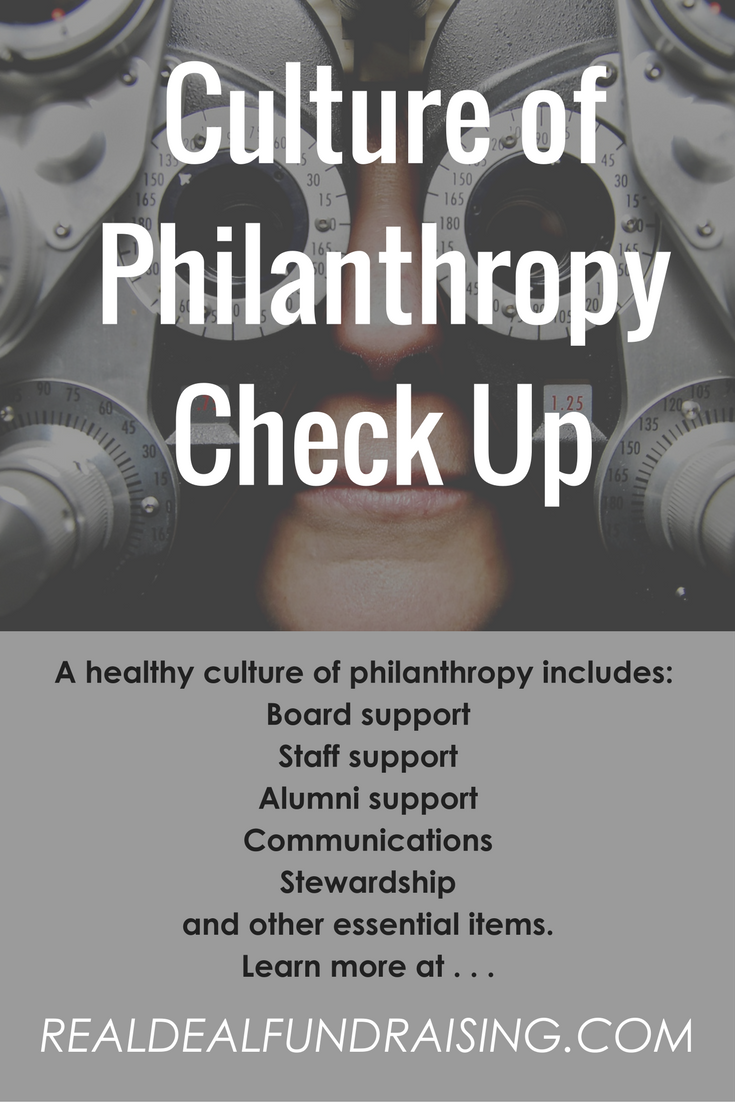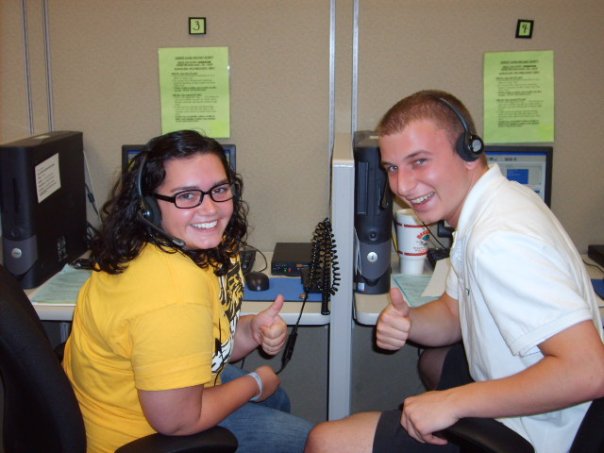|
Building and maintaining a culture of philanthropy is hard work. It is deep work that takes years to build and moments to destroy. But having a healthy culture of philanthropy makes work more fun and makes fundraising easier. It’s worth having a periodic check-up to assess how your institution is doing.
Answer these questions for your institution: Board Support
Staff Support
Alumni support (or Grateful Patient support)
Fun Factor
Communications
Stewardship and Donor Relations
Other questions to think about:
How did you feel about the assessment? Where are you doing well? Where should you improve? As always, comments and questions are welcome and encouraged! Cheers, Jessica PS - If you liked this post, you might also like these:
PPS - If you found this article helpful, please comment and let me know. Also subscribe to Real Deal Fundraising so you don't miss a post! You'll get my guide to Call Center Games for Free!  So, this weekend my debit card/checking account was hacked for over $1,100! Lucky for us, we have a great credit union that helped me get the issue fixed immediately Monday morning and all of it (including the overdraft fees that it caused) will be fully refunded. My mother asked me who actually ends up paying for these issues since the culprits are rarely caught. Strangely, I knew the answer because I have been trained on PCI compliance. The credit card companies end up eating the cost of fraudulent charges. If you aren’t familiar with the term, PCI or PCI DSS stands for Payment Card Industry Data Security Standard and it is an effort on the part of credit card companies to prevent fraud and protect their bottom line. Anyone who charges credit or debit card is responsible for handling cards in a PCI compliant way. As fundraisers (and more specifically phonathon managers), if you aren’t sure what PCI is or whether you are PCI compliant, you probably aren’t doing it right. Check with your Advancement Services staff and ask about this. Educate yourself, your student supervisors and your callers. The standards were updated in April 2016 and you can download them for review by visiting www.pcisecuritystandards.org/. This happened to me at the University of South Carolina. We utilized every standard and precaution and took it very seriously. However, over a six week period, we started to get a string of complaints about rogue charges a few days after the alumni had made gifts via phonathon. There was no traceable pattern to the issues. Although we never identified the offending caller, we did isolate through analysis of our nightly seating charts that it must have been a caller who was overhearing other callers read out the number to the prospect for verification. We changed that part of the script and never had a problem again. I talk about training our student callers about donor confidentiality and PCI compliance as often as I can because it impacts donor confidence in our organizations but also it impacts families. Most donors are not multi-millionaires, they are well meaning folks whose monthly budget can be wrecked by fraudulent charges and the time it takes to clean them up. So, review the policies and start asking questions about how data and credit/debit cards are handled in your shop. Train your employees about properly taking care of the data, which is really taking care of people. It’s part of stewardship and it’s super-important. If you found this article helpful, you may also be interested in my e-book How to Staff Your Phonathon Super-Fast: Seven Secrets to Fill the Seats. It's on sale now for $40 with the coupon code fillseats (valid through 9/1/16). This book guides you through innovative ideas and practices to turbo-charge your phonathon staffing efforts and break free from the hamster wheel of turnover. It also includes an appendix full of templates and samples to get you started implementing this system fast. Advancement Services, Information Services, the database folks: whatever you call them, the partnership between fundraisers and this team is crucial. Make or break. Critical.
Usually, this group includes prospect research, gift processing, and those that do the demographic updates. Sometimes it includes those that maintain your website and other tech resources. These professionals create the reports and files that drive the work of fundraisers. These professionals go out and get the information you need to succeed. If you trust them, you trust the data you see in the database. If you trust them, you know they will take care of your donor’s gifts just as you would. I’ve seen great partnerships between the development staff and advancement services. I’ve also seen departmental relationships which could best be characterized as Shakespearean (meaning you aren’t sure how many people might be dead before the meeting is over). Would you place a bet on which shop raised money more easily? Which group had a better time at work? It’s a strange thing. The more successful a fundraiser is (in any area of development) the more work it is for these staffers. You need them to be fully invested in your success, despite the fact that they will end up doing more work. Reach out to these folks. Start by making an effort to fully understand their policies and processes. Show an interest in how they want you to request things and why. Bring back useful information that enriches the database. You make the first move by being a truly valuable partner. Make them love working with and for you. Then be a friend. Acknowledge when you are making more work for them. Bring them cupcakes after you past milestones or significant deadlines. The effort you put into making this departmental relationship into a true partnership will be worth it. I promise. Your phonathon contact rate is a metric that measures your data integrity. It answers the question: How often does a completed call result in a solicitation of the correct individual?
Contact rate is defined as the percentage of your completed calls that are actual contacts. The formula is number of contacts divided by number of completes. As previously stated, all contacts (pledges, refusals, etc.) are completes but there are also other non-contact completes including deceased, wrong numbers, do not calls, disconnected, etc. If your contact rate is 36%, this means that out of 100 completed calls, you are only asking 36 people for a gift. The other 64 calls are marked as wrong numbers, do not calls, etc. It is difficult to raise money in this data environment. A strong contact rate would be in the 60-70% range. The more times that you talk to the correct person, the more chances you have to raise money. When contact rate improves, it becomes easier for the callers to raise money because they are making more solicitations per hour of work. When contact rate improves (even when call technique and caller performance does not improve), raising money becomes magically easier. So, if you have a contact rate problem, what are some inexpensive ways that you can begin to improve this metric? My first recommendation is always, begin with basic research. Basic level research is a two-step process:
Essentially, this process looks for people who have recently moved and then searches for whether there is a phone number at the new address. These two services are very inexpensive to undertake but are the foundation of a strong research program for phonathon fundraising. You should check with your advancement services staff to see if NCOA is being done regularly. Oftentimes this is standard procedure for advancement services to run an NCOA but a regular phone append process is less common. If your shop doesn’t already do this, begin lobbying for this to take place. I would recommend NCOA be done quarterly and a phone append annually or once per semester. Another thing to keep in mind as you inquire about this with advancement service staff is timing. Ideally, you would like NCOA and a phone append run in the summer as close as possible to the time that you begin you phone program for the new fiscal year. (Just make sure the results are incorporated into the database before the calling data is pulled and loaded.) Your effort will be rewarded. Any time spent on data integrity and research is like giving your callers a magical head-start on your fundraising goals. |
Jessica Cloud, CFREI've been called the Tasmanian Devil of fundraising and I'm here to talk shop with you. Archives
June 2024
Categories
All
|




 RSS Feed
RSS Feed
